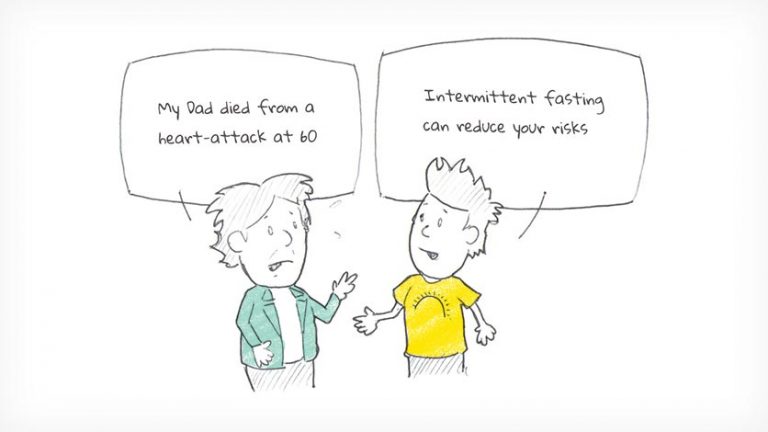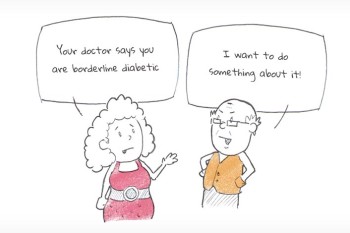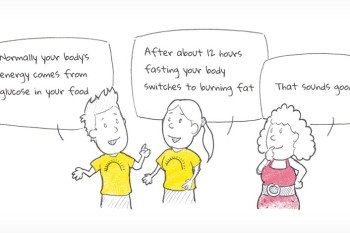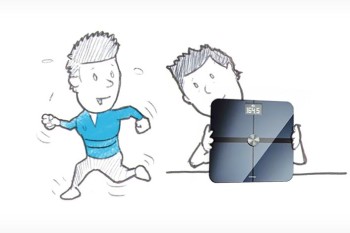How can intermittent fasting help my heart and circulation?
Intermittent fasting reduces your risk of heart and circulatory disease (cardiovascular disease), just as over-eating increases your risk. 1 Cardiovascular disease is a big killer in our modern society with 1 in 6 deaths in the USA being attributed to heart disease and 1 in 19 deaths due to stroke.2 Most people think of heart disease affecting mostly men, but women are also at risk. In fact, women are more likely to suffer a ‘silent heart attack’ (one where you don’t know you’ve had it) than men and their heart disease can go undiagnosed and so is left untreated.
The biggest risk factors for cardiovascular disease are:
-
Being overweight, particularly having a large waistline
-
Smoking
-
High blood pressure
-
Insulin resistance and high blood glucose
-
Diabetes
-
Poor diet
-
Lack of exercise.
Fasting can help with some of these: lowering weight, reducing insulin resistance, reducing the risk of diabetes and lowering blood pressure. Fasting can even promote a healthier diet as you’ll find that your craving for sweet, sugary and other junk foods is reduced. Fasting can’t help you exercise more or stop smoking though!
Learn more about intermittent fasting and diabetes
Learn more about what happens when we fast
How does cardiovascular disease develop?
Cardiovascular disease is a general term that includes all the all the diseases of the heart and circulation including coronary heart disease (angina and heart attack), heart failure and stroke. These diseases are all caused by a build-up of fatty deposits in the arteries (called atherosclerosis).
No-one is exactly sure what causes atherosclerosis. At first it seemed ‘obvious’ that having high levels of fats in your blood would increase the amount of fatty deposits in the arteries, but as scientific research has continued the picture has become more and more complicated. The exact kinds of fats (types of cholesterol and triglycerides) seems to be important. The degree of inflammation in the arteries (which may be a cause or a result of the fat build up) might also be an important factor. Carrying excess fat around your internal organs (called abdominal obesity) and having insulin resistance increases the risk of developing atherosclerosis.
What we do know is that once there is a build-up of fats within the arteries they become stiffer and narrower, which is shown by an increase in blood pressure as it takes more pressure to force the blood through the narrowed arteries. If the arteries that supply the heart itself with blood are narrowed you may get symptoms of angina. If the arteries that supply the legs with blood are very narrowed you can get pains in the legs when walking (intermittent claudication). Damage to the blood vessels in the kidneys can cause kidney disease. The heart has to work harder to pump the blood and it grows in size but unfortunately this growth in size tends to reduce the space inside it for the blood and a condition called congestive heart failure may develop.
What’s more there is a risk that a lump of the fatty material can break off from the vessel wall. This lump is carried in the circulation and can become stuck in the narrower blood vessels. If the lump is trapped in the blood vessels that supply the heart itself with blood, that is a heart attack. If the lump is trapped in the blood vessels in the brain it is a stroke. If it is trapped in the blood vessels of the lung, it is a pulmonary embolism. If it is trapped in some other vein, often the leg, it is called a deep vein thrombosis.
How do I know whether I have cardiovascular disease?
It is not easy to tell whether someone has early cardiovascular disease but doctors use information about the risk factors (weight, blood pressure, smoking, high blood glucose, exercise levels, cholesterol tests) to assess your risk of having cardiovascular disease. You can check your risk of developing cardiovascular disease using this calculator, or to see your risks of diabetes as well as cardiovascular disease and how changing your risk factors might alter your risk use this calculator.
How can intermittent fasting help cardiovascular disease?
Many studies of intermittent fasting have found improvements in cardiovascular risk factors like weight (and particularly fat that is stored around the waistline), blood pressure, cholesterol and insulin resistance.
-
People who fasted for 24 hours once a month were less likely to have been diagnosed with coronary artery disease in a study of 448 people in Utah and those who fasted also had less diabetes.3
-
Overweight and obese women who fasted every other day(with a single 500/600 kcal meal on fast days) for 8 weeks lost weight and reduced their waist size, lowered their blood pressure, decreased cholesterol and low density lipoprotein (LDL) and blood glucose.4 In a further study, it was found that similar improvements in cardiovascular risk factors were seen whether people ate a standard American diet or a low-fat diet on the non-fast days.5 Many other studies of alternate day fasting (ADF) have confirmed the benefits of fasting on cardiovascular risk factors.6-11
-
Overweight women who semi-fasted for two days per week (600 kcal allowance) showed reductions in leptin, inflammation, total and LDL cholesterol, triglycerides, blood pressure and insulin resistance.12
-
Daily fasting during Ramadan has been shown to improve cardiovascular risk in several studies.13-15 However, some studies have shown no benefit from Ramadan fasting in terms of cardiovascular risk. This may be related to differences in diet during the month of Ramadan in the different studies.
Exactly how intermittent fasting causes these beneficial changes to cardiovascular risk is not yet known, but it seems likely that improvements in insulin resistance and inflammation may be key factors. The reduction in waist size is a good indicator of how you’re reducing your risk of cardiovascular disease which is why at FastDay we recommend you measure your waist to monitor your progress.
Learn more about measuring progress
Learn more about fasting with medical conditions
Real life experiences
There are many people in our FastDay community who have obtained reductions in blood pressure, cholesterol, waist size and other cardiovascular risk factors through intermittent fasting.
Cholesterol measurements
Most doctors consider that blood tests for cholesterol are a good indication of a person’s risk of heart disease and diabetes. Recently, however, the complexities of the many different types of cholesterol in our blood has only just begun to be appreciated. It appears that total cholesterol is not a particularly good measure of health risks. It is thought that the ratio between total cholesterol and high density lipoprotein (HDL, sometimes called ‘good cholesterol’) levels might be more relevant, but even that is not certain. Nonetheless, if you have been told that you have high cholesterol levels, you may wish to have them tested from time to time to see if intermittent fasting reduces your levels. Be warned, however, that during the fast itself cholesterol levels can be temporarily raised if your fast is longer than around 10 hours, so it is best to have the blood taken on a non-fast day.
Read more about measuring success with intermittent fasting















